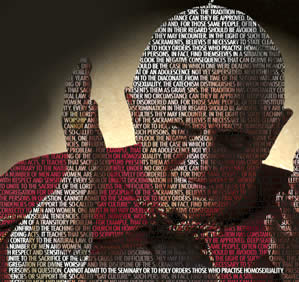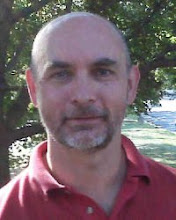 A digitally manipulated picture of a scary, menacing Pope Benedict XVI covers the entire front page of the Washington Blade's final edition for 2005. The Blade is the newspaper for Washington's gay community, available free at many outlets around the city (including my gym on Capitol Hill). When I first saw the cover and the title of its accompanying story ("Blessed Bigotry: Pope Benedict XVI is anti-gay person of the year,") I was expecting to find inside a diatribe more emotional than substantive, using the sometimes tired language that one can find occasionally in the gay press.
A digitally manipulated picture of a scary, menacing Pope Benedict XVI covers the entire front page of the Washington Blade's final edition for 2005. The Blade is the newspaper for Washington's gay community, available free at many outlets around the city (including my gym on Capitol Hill). When I first saw the cover and the title of its accompanying story ("Blessed Bigotry: Pope Benedict XVI is anti-gay person of the year,") I was expecting to find inside a diatribe more emotional than substantive, using the sometimes tired language that one can find occasionally in the gay press.After reading the story, I happily admit my expectations were not met. Although its premise at first may seem offensive to Catholics, the author writes convincingly of why the current occupant of the Chair of Peter deserves the designation given him. Benedict has been the author and architect of Rome's strategy of progressive denigration and even demonization of gay men and women.
"'His rhetoric is obscene. He wants gays clearly taken care of — it’s almost like the Final Solution,' said Kara Speltz, a Catholic lesbian activist for Soulforce, an organization dedicated to ending anti-gay discrimination within all religions."
My prayer for 2006 is that Catholics -- gay, straight, lay, religious, and ordained -- and all people of good will, will find ways of making their voices heard and be faithful to that foundational Christian principle which recognizes the inherent dignity of the human person, each and every one of us a beloved child of God.



